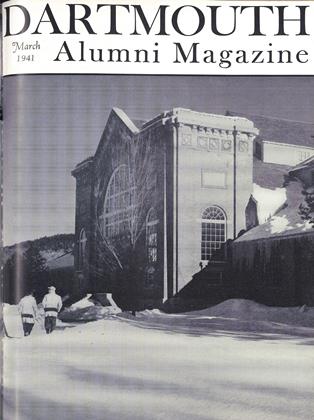WAR AND EDUCATION do not mix. War vs. education. Stories filter back from the Continent that Nazi parachutists are fanatical boys of 15, 16, and 17 who do not surrender. Their fanaticism dictates death rather than yielding. To this they have been trained.
Youth is the age to train good soldiers. They can be made to hate so that turning a bayonet in a man's stomach is simply a glorious duty. Youth is also the age when the seeds of education most fruitfully take root; when boys calmly and without prejudice are challenged by their teachers to seek beauty and truth.
In his fine novel Come Spring Ben Ames Williams puts words of wisdom in the mouths of Philip Robbins, pioneer, and his son-in-law, Joel Adams. Talking about the Revolution Philip says: "War's no time forthinking. All you can do is follow thecrowd, do what the crowd does. Let youchange step, or fall behind, or get out ofline, and they'll rip you like wolves."
Joel suggested: "I say a man always hasa right to think for himself."
Philip replies: "He can think as he likes,but he'll do as he must—and thinking different only makes him unhappy in the doing."
Must the colleges, perhaps in the not distant future, say to their students: Now is the time to stop thinking. Drop your work, your lives, and forget education. Go and fight, with our blessing.
THERE IS NO EASY answer to the question. The wisdom of authorities in Washington will be followed on the question of when will the time come no longer to exempt college and university students from the Draft. Until then the policy of the Dartmouth Defense Group should, it seems to us, be followed: a policy of advising, and urging, students to stick to their job of going to college "reasonably and patiently, without hysteria." The great majority of undergraduates, the committee advised through The Dartmouth last month, "may accept the Selective Service Act as the measure of their patriotic devotion: they are not obliged, and would not be wise, to volunteer before they are called."
This is sound counsel. But some branches of the service, particularly aviation, are already tempting restless and adventuresome students beyond the point of a slight resistance.
Looking on the most fearsome side of world affairs, the time may come when the College and all its cherished man power will show deeply the scars of conflict. Until then, and thereafter, the institution—its students, faculty, and alumni—must continue to move, in whole-hearted faith, toward the eternal goals of education: true progress, high achievement, and a better world. This forward march of human betterment has already been interrupted for many men. The interruptions will be more serious before they are less. But education's large share in the movement, with wholehearted faith, must prevail over the long pull.
 View Full Issue
View Full Issue
More From This Issue
-
 Article
ArticleLewis Parkhurst, Trustee
March 1941 By Edward K.Robinson '04 -
 Article
ArticleGreece and Daniel Webster
March 1941 -
 Article
ArticleBig Green Teams
March 1941 By Whitey Fuller '37 -
 Article
ArticleThe Undergraduate Chair
March 1941 By Charles Bolte '41. -
 Class Notes
Class Notes1921*
March 1941 By CHARLES A. STICKNEY JR. -
 Article
ArticleA Generation Finding Itself
March 1941
S. C. H.
-
 Article
ArticleGRADUS AD PARNASSUM
January 1933 By S. C. H. -
 Article
ArticleGRADUS AD PARNASSUM
November 1933 By S. C. H. -
 Article
ArticleGRADUS AD PARNASSUM
April 1934 By S. C. H. -
 Article
ArticleIN MEMORIAM
April 1934 By S. C. H. -
 Article
ArticleGRADUS AD PARNASSUM
March 1941 By S. C. H. -
 Article
ArticleLiberal Tradition
March 1941 By S. C. H.







